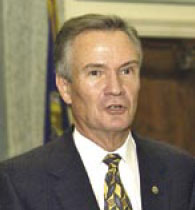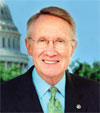Outlook 2007 Washington
Oil and gas will have an uphill battle in Washington
A new Democratic majority in Congress will make the jobs of industry lobbyists twice as tough as before, and may lead to punitive legislation.
John McCaughey, Contributing Editor, Washington Marley was dead, to begin with. There is no doubt whatever about that. The register of his burial was signed by the clergyman, the clerk, the undertaker and the chief mourner. Scrooge signed it. And Scrooge’s name was good upon ‘Change for anything he chose to put his hand to. Old Marley was as dead as a door-nail.
 |
As Charles Dickens might have said, �The Republicans were dead, to begin with. There is no doubt whatever about that.�
|
|
Thus, memorably, begins Charles Dickens’ classic 1843 story, A Christmas Carol. One hundred and sixty four years later, the passage perfectly captures the mood that was in Washington during Christmas 2006—with newly minted Speaker of the House Nancy Pelosi (Dem.–California) playing the part of the all-powerful Scrooge (see the illustration of Dickens on this page).
Pelosi and her fellow Democrats are convinced that the Republicans are as dead as a door-nail on Capitol Hill and, controlling both chambers, are poised to wreak a reign of revenge against their Republican rivals, and to settle old scores long a’festering. And we’re not just talking about changing the drapes in the corner office.
After the party’s crushing defeat in the November mid-term election, one Republican wag is going around Washington saying that “it’s gotten so bad that you can’t trust the voters anymore.” The Republicans were a victim of the traditional “six-year itch” against the party in power. An unpopular war didn’t help either. In any case, voters like mixed government. Even lobbyists like it, because it provides more of a demand for expert advice (if you can use that term for what lobbyists provide).
But is the situation really this simple? And what’s likely to happen in the next two years? His authority ebbing daily and obsessed by his political legacy, President George W. Bush is showing signs of turning his back on right-wing Republicans and currying favor with the Democrats. He speaks frequently of “bi-partisan cooperation.” The trouble with that is that the Democrats are in no mood for bi-partisan cooperation, although (sensibly) they don’t say so out loud. After 12 years in the cold, there are too many old scores to settle. And they are consumed by their hatred of Bush.
So let us make a random little list of the outlook: the good, the bad and the ugly—the winners and losers likely to show up in the 110th Congress.
GENERAL
Senate Majority Leader Harry Reid (Dem.-Nevada) talks about “an energy security plan...to wean our country off its dependence on foreign oil.” But this is pure moonshine. As Reid must know, there have been half-a-hundred energy plans over the decades, and not one has done a bit of good. Short of annexing the entire Middle East, there will be no US energy independence.
Energy Secretary Samuel Bodman, with his fatuous “New Energy Plan for America,” is just as bad. Bodman has been such a success in the job that if you put 10 million Americans in a football stadium, not one of them could name the Secretary of Energy.
COMMITTEES
Congressional committees are more important than many laymen realize, and there will be some meaningful changes in the chairmen of energy and environmental committees in the Senate and House. For example, Sen. Jeff Bingaman (Dem.-New Mexico) will take over the important Energy and Natural Resources Committee. In addition to its general clout on energy matters, the committee controls appointments to the Department of Energy and the Federal Energy Regulatory Commission. Republicans in both places might think of looking for alternative employment, or at least hiding under their desks. Or retreating to a quiet corner and doing their imitation of a potted plant. And FY 2007 budget increases are likely to be slim to non-existent.
The Senate Environment and Public Works Committee is now led by the infamous Sen. Barbara Boxer (Dem.-California), one of the most liberal members of that body, and someone who has never seen a Greenie (environmental) measure that she did not endorse.
Meanwhile, Rep. John Dingell (Dem.-Michigan) is, at 51 years, the longest-serving House member and, at age 80, much stricken in years but mentally acute as ever. He will be back in the chair at the powerful House Energy and Commerce Committee. One should expect many more of his famous “Dingell-gram” demands for information that always go for the soft underbelly, and that chill the blood of CEOs. Dingell is a big fan of diesel engines, but he is wary of higher fuel economy standards. (Hey, the guy is from Michigan, home to auto manufacturers, after all.) Dingell will be egged on to harass the nukes by Rep. Henry Waxman (Dem.-California).
RENEWABLES
To the glee of the Greenies, renewables and (often very vaguely defined) energy efficiency measures were probably the biggest winners in the election. They now contentedly face a barrage of more subsidies. Even ethanol will probably get more—if it is possible to subsidize ethanol more than it already is subsidized by taxpayers. In addition (and unlike former chairman, Sen. Pete Domenici, Rep.–New Mexico), Bingaman is an ardent supporter of renewables.
When the extra subsidies kick in, a feeding frenzy among hydropower, biofuel, wind, geothermal and solar producers can be anticipated.
NUCLEAR
A cataclysmic loser in the November election, nuclear power’s influence at the White House and on the Hill is now virtually nil. Not in the least, this is true, because the idiotic Nuclear Energy Institute (more of a retirement home for overpaid staffers than an energy trade group) adamantly refused to see which way the wind was blowing, and to hire at least a token senior-level Democrat before the election. On K Street and among Hill Democratic staffers, NEI is known as the most effective, circular firing squad in town. Its chief lobbyist is cordially detested by Hill staffers, on a bipartisan basis. It is run by a clapped-out old admiral.
And Sen. Reid is passionately opposed to the activation of the Yucca Mountain waste dump, the most expensive concrete-lined hole in the ground that the galaxy has seen. Yet, without a waste dump, nuclear power can go nowhere. Sen. Bingaman, who has two big federal nuclear research facilities in his state, is a fan of nukes, but he is a lonely voice in the Senate. And passionate Greenie Sen. Boxer will have jurisdiction over the Nuclear Regulatory Commission.
CLIMATE CHANGE
House Speaker Nancy Pelosi feels strongly about doing something about climate change, although what she wants to do is far from clear—apart from throwing money at renewables and gassing on about the topic. Sen. Boxer feels even more strongly about global warming, and she can be expected to thresh around on the topic.
OIL AND GAS
It gets a little complicated here. There is much talk among Democrats of slashing tax breaks to the industry and curtailing coastal drilling (the ANWR issue appears to finally be in the grave). Tax breaks for refineries are also targeted, at a time when no new refinery has been built for many years.
The enviros are preparing hundreds of PowerPoint presentations, and Big Oil is the nasty guy. It is impossible to persuade the politicians, it seems (although API does its best), that Big Oil has hugely reduced its presence in the US and that, in any case, it does not receive or need many subsidies. Nor does Big Oil make profits that (measured as a percentage of revenue) are so very large, being beneath those of high-flyers like Microsoft or Coca Cola. However, the oil companies take a lot more risks and are far more cyclical.
Taxing the oil and gas industry more will only harm consumers, because the tax increases flow through and show up at the pump. Oil companies will have less cash to invest in E&P, even as demand increases. Chemical producers, who use natural gas as a feedstock, will move abroad, causing job losses in this country. Domestic US producers will be disadvantaged in production against the Chinese and other importers. The people who will mainly suffer are the US independent producers, the very people that the Democrats should be supporting in the name of energy independence. Go figure. But you can’t teach color to a blind man.
History repeats itself, and the Democrats’ new mantra is eerily reminiscent of Jimmy Carter’s idiotic Windfall Profits Tax in 1980, which slashed US domestic production and helped considerably to increase imports from OPEC. It took Ronnie Reagan coming along eight years later to get rid of that piece of silliness.
In the end, it seems unlikely (given the slim majorities) that the Democrats will be able, in the next two years, to deliver on many of their expansive ideas on energy policy. This is to their credit—the greatest compliment one can pay a politician is that he has achieved nothing. In essence, the Hill is now divided between the Democrats, who have no new ideas or ideology at all, and the Republicans, who have forgotten how to lead and can think of nothing to do but whinge. From the voters’ point of view, this seems a satisfactory enough state-of-affairs. Never mind the 100 Hours that the Demos ballyhooed as energetic, proactive, legislative leadership. There is much to be said for a Do Nothing Congress.
What will be most interesting and amusing will be what Jeeves explained to Bertie Wooster: “The psychology of the individuals, Sir.” What will tell will be the relationships between the House and Senate, and between the power-crazed, egomaniacal politicians, themselves. House Speaker Nancy Pelosi, for example, gets on far from well with Majority Leader Steny Hoyer (Dem.–Maryland), and there are scores of other feuds going on at any given moment. Politicians have a conceit that politics are about “issues” and not “personalities.” Privately, they know that this is all rubbish. But they go on saying it.
For the Republicans on the Hill, they can have a nice rest. After spending like drunken sailors for years under President Bush, they can piously pose as spending-cutters. With the absence of power, points out American Enterprise Institute economist Kevin Hasset, comes the absence of accountability and blame. “Being in the minority means never having to say you’re sorry,” says Hasset. The Republicans can also reflect happily that the rather naive public now expects that with the Democrats in charge, things will get much better. When that (inevitably) fails to happen, the Republicans will benefit in 2008—if they can find someone credible to run for the White House.
Whatever happens, the New Year brings a pleasing recollection in Washington of Robert Heinlein’s observation that “Politics is the greatest sport in the world. Horse racing, gambling, football, the fights—all of these things are childish and trite compared with this greatest sport. Politics is a game where you always play for keeps....”
And for the sheer intellect of the thing. In a recent debate on some new ethics package (which will never be acted upon), the new chairman of the House Rules Committee, Rep. Louise Slaughter (Dem.-New York), speaking on the House floor during the debate, said: “Let me just yield myself about 30 seconds or 45 seconds, whichever comes first.” 
A Coalition of Coalitions
From about 1916 to 1920, there existed in Zurich, Switzerland, an anti-establishment artistic movement called Dada or Dadaism, involving art theory, poetry, theatre, graphic design and other endeavors. The movement was much opposed to World War I. It had been established by one Tristan Tzara, more prankster than the poet he claimed to be (none of his poems survive). He said, �God and my toothbrush are Dada, and New Yorkers can be Dada, too, if they are not already.� The Dada group's anarchic publications, public demonstrations and exhibitions for a while attracted a huge amount of publicity and even funding from the bourgeoisie, whom it set out to mock.
 |
Former Sen. John Breaux, co-leader of The Energy Initiative.
|
|
Slowly, unsummoned, the memory of the surreal Dada began to steal into my brain while sitting one morning recently in a large meeting room at the J.W. Marriott hotel in Washington, next door to the National Press Club. There were perhaps six journalists in the room and 200 other persons in suits. These persons worked for Washington energy trade groups and had been instructed to be present to �make crowd� (J.W. Marriott waiters can be persuaded to put on suits to make crowd but it's cheaper to use your own staff).
We were there to witness the launching of The Energy Initiative, billed as the �first-ever coalition of energy consumer and producer groups committed to finding new solutions to America's energy challenges.� The meeting was fronted by former Sen. John Breaux, a Louisiana Democrat, now reportedly an effective rainmaker for the big Washington law firm of Patton Boggs. A colleague of Breaux's described him to us as �handsome, charming, smart and ruthless.� The Energy Initiative boasts about 29 members�including all the Washington energy trade groups and many business groups. But what's it all about? Nobody seemed to know.
Breaux babbled gamely on about �the country's shared goals of providing Americans with reliable and affordable sources of energy while protecting the environment and fueling the economy. Energy producers and consumers, long used to eyeing each other warily and pursuing separate policy goals, must set aside their unilateralist instincts. The time for consensus on energy policy is here.
�This coalition brings together, for the first time, a broad range of energy consumers and producers committed to educating the public about energy policies and securing our energy future. We all share the goal of working together, in a transparent and deliberative way, to identify and develop consensus on energy policies. There is a public clamor for an energy policy that satisfies the general needs of the country, rather than the limited needs of various stakeholder groups.�
The Energy Initiative would deliver its report in six months, he promised, and submit its recommendations to Congress and the White House. Behind Breaux, about a dozen heads of various Energy Initiative groups had been arranged, standing in a semi-circle. They all looked extremely uncomfortable and some shuffled their feet. Tom Kuhn, head of EEI (the electric utilities) seemed conspicuously bored. They looked as if they were being told to drink the Kool Aid at Jonestown� obedient but somewhat suspicious.
One's temples began to throb, and the shade of Tristan Tzara sitting beside us began to giggle. Rightly so�how will The Energy Initiative differ from the thousand other task forces and studies (including Vice President Cheney's) of recent years? And answer came there none. One was being spoofed, but one did not know quite how one was being spoofed. Breaux is indeed clever. But all the members of The Energy Initiative are being spoofed too�by Patton Boggs. And it's all on the bill. The meter is running.
The whole bogus press conference is wonderfully vague: a Coalition of Coalitions, Greatest Good for the Greatest Number, a New Vision, Ten New Ideas, Reliable and Affordable Supplies of Energy needed for a Sound Economy and a Rising Standard of Living, Lack of Understanding of Basic Energy Facts blocks success in forming a Viable Energy Policy.
One's bum aches, and a weary stillness fills the bones. But this is a Washington �press conference� after all. �The information contained in this communication is confidential and is intended only for use of the addressee. It is the property of a well-known Washington public relations firm. Unauthorized use, disclosure, or copying of this communication is strictly prohibited. If you have received this communication in error, please notify us immediately� and destroy this story, including all the rest of this magazine.
|
|
THE AUTHOR
|
|
John McCaughey edits and publishes Energy Perspective, a Washington-based, fortnightly publication featuring in-depth coverage of major energy topics. Mr. McCaughey has written and edited for Irish newspapers, an international news agency, the London-based Financial Times and the US-based Energy Daily newsletter, and contributed to many other newspapers. He regularly contributes to this column.
|
|
|








